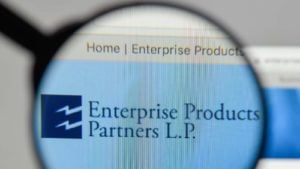To find a dividend stock’s yield, you divide the amount of dividends per share a company pays by the stock’s price per share. So, if a stock’s price falls the yield rises. And of course, if a stock’s price is falling there could be something wrong with the business.
But not all ultra-high yield stocks are broken business. Sometimes perfectly healthy companies offer a dividend that results in rising rates. Or it is simply the nature of the industry. Real estate investment trusts (REIT), for example, are required to pay out almost all of their profits as dividends, so they tend to offer above-average yields.
Below are three ultra-high-yield stocks that fit that mold. Their businesses are sound, but the yields offered are lucrative. You may want to buy their stocks by the handful.
Enterprise Products Partners (EPD)

Midstream oil and gas industry operator Enterprise Products Partners (NYSE:EPD) is the premier transportation, storage and exporter of oil, gas and natural gas liquids (NGL), where it is the dominant player. It operates under long-term contracts, with its customers and gets paid regardless of whether the customer takes possession of the product or uses the requested capacity.
It is the NGL business that is the linchpin to future growth. Enterprise Products saw an opportunity early on and developed an extensive export infrastructure. Because oil and gas companies utilize advanced drilling techniques, they reached previously unattainable reserves. That made the U.S. the world’s top exporter of liquid natural gas (LNG) in 2023. Although LNG and NGL are different things, NGLs could be hurt by the Biden administration’s “pause” on LNG exports to non-free trade countries nonetheless.
Because most of the export market is to such locations it could impede natural gas production in the U.S. And since NGLs are a byproduct of natural gas production — as much as 90% of NGLs come from natural gas — exporters could be collateral damage.
Yet, global demand for NGLs will continue to grow. With the U.S. as the premier source for low-cost supply, Enterprise Products Partners is perfectly positioned to capitalize. Its dividend yields 7.3% annually and should support significant capital appreciation to come.
Ares Capital (ARCC)

Ares Capital (NASDAQ:ARCC) is the largest, publicly-traded business development company (BDC). It owns over 500 middle-market businesses worth almost $23 billion. Shares are up 7% in 2024 and are just about to hit a new 52-week high. The dividend yields 9% annually.
BDCs are very much like REITs in that they are also required to pay out at least 90% of their taxable income as dividends to shareholders. It offers investors a 10-year regular or base dividend per share growth rate exceeding 26% and has enjoyed a 19% total return on its stock.
Yet, Ares lags the market due to the Federal Reserve’s unprecedented rate hike policies. It raised interest rates 11 times last year and now shows no interest in lowering them. As inflation remains stubbornly elevated, the high interest rates raise borrowing costs and Ares’ expenses increase.
The BDC still represents a good long-term play on the American economy growing over time, and its lucrative payout makes it worth waiting until the stock returns to growth.
JPMorgan Equity Premium Income ETF (JEPI)

Admittedly, buying the JPMorgan Equity Premium Income ETF (NYSEARCA:JEPI) is the riskiest ultra-high-yield stock of the three. It is still worth considering. As an exchange-traded fund (ETF), JEPI owns a basket of top dividend stocks. Its top three holdings are Trane Technologies (NYSE:TT), Microsoft (NASDAQ:MSFT) and Amazon (NASDAQ:AMZN). Its top 10 holdings make up over 15% of the portfolio. The ETF offers a yield of 7.5% and a low expense ratio of 0.35%.
What you might notice is that while many of its holdings offer relatively low yields of around 1% some, like Amazon, don’t even pay a dividend. So, how is JEPI such an ultra-high-yield stock?
That’s because it invests up to 20% of its portfolio into equity-linked notes (ELN), essentially an advanced covered call option. JEPI collects premiums from buyers of those options. So, most of the dividends JEPI pays are from those premiums. That means JEPI will do much better during volatile market periods, which can also push its yield even higher than what it is now. Historically, though, the dividend yield is in the 5% to 8% range. But “historical” is a misnomer, as JEPI has only been around since 2020.
Moreover, ELN income and covered call income can be taxable. It means owning JEPI stock is best suited for tax-free or tax-deferred accounts. This ultra-high-yield stock may be best for those about to retire or are retired and looking for immediate dividend income — or in the next few years.
The JPMorgan Equity Premium Income ETF is not for everyone but does have its place in some investor’s portfolios.
On the date of publication, Rich Duprey did not hold (either directly or indirectly) any positions in the securities mentioned in this article. The opinions expressed in this article are those of the writer, subject to the InvestorPlace.com Publishing Guidelines.
Rich Duprey has written about stocks and investing for the past 20 years. His articles have appeared on Nasdaq.com, The Motley Fool, and Yahoo! Finance, and he has been referenced by U.S. and international publications, including MarketWatch, Financial Times, Forbes, Fast Company, USA Today, Milwaukee Journal Sentinel, Cheddar News, The Boston Globe, L’Express, and numerous other news outlets.
